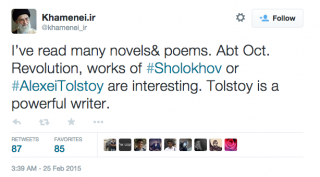March 5, 2015
#Ayatollah #Khamenei #isreading
by Julia Fleischaker
 Ayatollah Khamenei, Iran’s supreme leader and most powerful figure, took to Twitter last week for the same reason so many of us do – to talk about books. In a series of tweets to his more than 100,000 followers, he proclaimed his admiration for Soviet authors Mikhail Sholokhov and Alexei Tolstoy.
Ayatollah Khamenei, Iran’s supreme leader and most powerful figure, took to Twitter last week for the same reason so many of us do – to talk about books. In a series of tweets to his more than 100,000 followers, he proclaimed his admiration for Soviet authors Mikhail Sholokhov and Alexei Tolstoy.
“Tolstoy is a powerful writer,” wrote the Ayatollah in a series of tweets. “I like Alexei #Tolstoy, an amazing writer; till 1925 he was anti-revolutionary then he grasps #revolution, returns home to write The Ordeal.”
A distant relative of Leo Tolstoy, Alexei Tolstoy was a former nobleman who became a major Soviet artist. The Ordeal, a trilogy, covers the October Revolution and the civil war, the author writing of it that “I not only acknowledge the Revolution – with such acknowledgement alone it would not be possible even to write a novel – I love its dark majesty, its world-wide scope. And that is the task of my novel – to create this majesty, this scope in all its complexity.”
“I’ve read so much on Oct. Rev.,” tweeted Khamenei. “#Sholokhov’s The Quiet Don is good but #Tolstoi’s The Ordeal is better in depicting a #revolution.”
Better known in English translation as And Quiet Flows the Don, Sholokhov’s epic, portraying life in a Cossack village, is the reason he was awarded the Nobel. Announcing him as winner, judges cited “the artistic power and integrity with which, in his epic of the Don, he has given expression to a historic phase in the life of the Russian people”.
The Guardian spoke to Daniel Kalder, who’s writing a book on the reading habits of dictators, who found the choice of Tolstoy’s The Ordeal to be a particularly interesting one. “This stuff would have been circulating in Iran but what is interesting about it is that it seems the theocratic regime did not object to these books, even though they were written by people who were overtly atheist Marxists. They were able to overlook that and see its revolutionary value.”
Cathy McCann at PEN International thinks the Ayatollah’s tweets were an insult to writers, and readers, in Iran, noting that despite promises to expand freedom of expression, dozens of writers in Iran “remain behind bars and arrests are continuing. Writers facing persecution continue to flee Iran in large numbers, and many report continued harassment by the authorities towards family members who remain in the country.”
Julia Fleischaker is the director of marketing and publicity at Melville House.